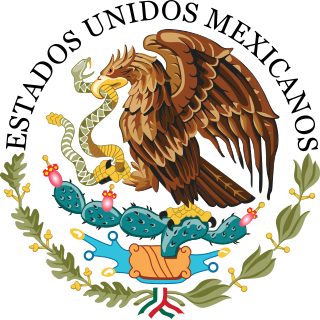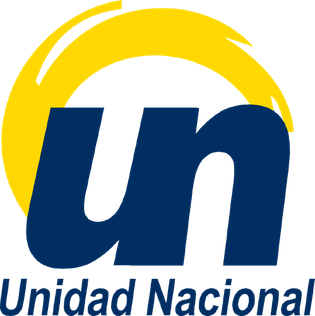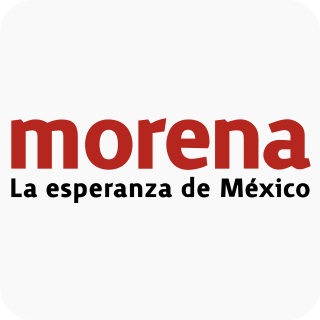
The politics of Mexico function within a framework of a federal presidential representative democratic republic whose government is based on a multi-party congressional system, where the President of Mexico is both head of state and head of government. The federal government represents the United Mexican States and is divided into three branches: executive, legislative and judicial, as established by the Political Constitution of the United Mexican States, published in 1917. The constituent states of the federation must also have a republican form of government based on a congressional system as established by their respective constitutions.

The National Action Party is a conservative political party in Mexico founded in 1939. The party is one of the main political parties in Mexico, and since the 1980s has had success winning local, state, and national elections.

The Galician Nationalist Bloc is a political party from Galicia, formed with the merger of a series of left-wing Galician nationalist parties. It is self-defined as a "patriotic front".

The Ecological Green Party of Mexico is a green political party in Mexico.

The Labor Party is a political party in Mexico. It was founded on 8 December 1990. The party is currently led by Alberto Anaya.

Citizens' Movement is a Mexican center-left political party. The party was founded on August 1, 1999, under the name Convergence for Democracy by civil society members and former members of the Institutional Revolutionary Party. In August 2002, it shortened its name to Convergence, and in 2011, it changed its name to Citizens' Movement.

The Christian People's Party is a centre-right and conservative political party based on the principles of Christian democracy. It was founded in 1966 by Christian Democratic Party dissidents, led by Luis Bedoya Reyes, at the time mayor of Lima.

The Mexican Democratic Party was an ultra-Catholic social conservative political party in Mexico that existed between 1979 and 1997. At its height in 1982, the party had over 500,000 active voters and 12 seats in the Mexican Chamber of Deputies.

The New Alliance Party is a state-level political party in Mexico founded in 2005.

Peruvian Nationalist Party is a centre-left to left-wing political party in Peru.

The National Unity Front is a political party in Bolivia. It was founded in late 2003 by Samuel Jorge Doria Medina Auza, who had broken with the Revolutionary Left Movement earlier that year. It has 36 members of the Chamber of Deputies in the Plurinational Legislative Assembly. Despite its substantial share of the urban vote, and 16 former mayors, it does not control any city halls or governorships. The party is closely identified with Doria Medina's cement company Sociedad Boliviana de Cemento (Soboce).

The Cuban Revolutionary Party – Authentic, commonly called the Authentic Party, was a political party in Cuba most active between 1934 and 1952. Although the Partido Auténtico had significant influence, it eventually became unpopular due to corruption scandals and, despite significant reforms, Fulgencio Batista returned to power after a coup d’etat.

The Social Democratic Party or Social Democratic and Peasant Alternative Party was a left-wing Mexican political party between 2005 and 2009. It defined itself as a New Left party and distanced itself from what they claimed was the "conflictive left" in Mexico. Founded by Patricia Mercado and Ignacio Irys Salomon, the party nominated Patrica Mercado for the 2006 general election.

The National Solidarity Alliance was an electoral alliance in Peru formed for the 2011 general election, dominated by the eponymous National Solidarity Party and led by presidential candidate Luis Castañeda.

Peru Wins was a leftist electoral alliance in Peru formed for the 2011 general election. It was dominated by the Peruvian Nationalist Party and led by successful presidential candidate Ollanta Humala Tasso.

MORENA is a major Mexican left-wing political party. It is described as an anti-neoliberal and populist party. It is the ruling party of Mexico since 2018. As of 2023, it is the largest political party in Mexico by number of members.

Eusko Alkartasuna is a Basque nationalist and social-democratic political party operating in Spain and France. The Basque language name means Basque Solidarity and abbreviated as EA. The party describes itself as a "Basque nationalist, democratic, popular, progressive and non-denominational party". The party has adopted the slogan "Euskal Sozialdemokrazia".

Social Encounter Party was a Mexican conservative political party established on the national level in 2014 and dissolved in 2018. It was part of the coalition Juntos Haremos Historia with the National Regeneration Movement and Mexico's Labor Party for the 2018 Mexican election.
The Agreement of Nationalist Unity, frequently known under the name of its constituent parties, Canarian Coalition–Canarian Nationalist Party, was a permanent Canarian nationalist alliance formed by Canarian Coalition (CC) and Canarian Nationalist Party (PNC) in 2006 ahead of the 2007 Canarian regional election. The alliance has been renewed several times, in 2011, 2013 and 2018. For the 2011 and November 2019 general elections it was joined by New Canaries (NC). The alliance was dissolved in 2023, with the PNC arguing that the CC had now « nothing of nationalist »
The Constitutional Nationalist Party – Union for Integration and Resurgence, often known by the shortened name UNIR Constitutional Nationalist Party or simply UNIR Party, is a conservative political party in Argentina founded in 1982 by Alberto Asseff, a former member of the Radical Civic Union. It is currently part of the Juntos por el Cambio coalition, and Asseff sits in the Argentine Chamber of Deputies since 2019 representing Buenos Aires Province. For most of its history it has supported Peronist candidates and alliances.

















